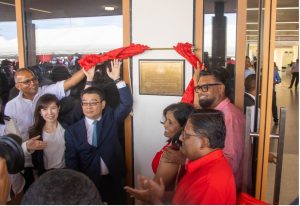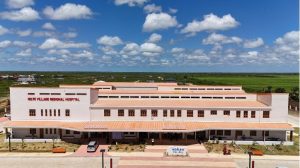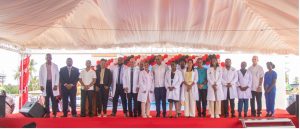His Excellency Dr. Mohamed Irfaan Ali, President of the Cooperative Republic of Guyana, officially commissioned the cutting-edge No. 75 Regional Hospital, declaring it a “red-letter day in the history of this proud region” and a milestone in Guyana’s transformation into a nation of modern, accessible, and inclusive healthcare.
The facility now stands as the most advanced healthcare institution in the East Berbice-Corentyne region, and the sixth of its kind to be opened in recent months. It marks a significant leap forward in the Government’s vision of equitable healthcare for all Guyanese, not just those in Georgetown.

His Excellency Dr. Mohamed Irfaan Ali, President of the Cooperative Republic of Guyana, Honourable Minister of Health, Dr. Frank Anthony and other officials unveil the plaque at the commissioning ceremony of the No. 75 Regional Hospital
“This hospital is not just a building, it is a promise fulfilled,” President Ali stated. “It is proof that when we say we are investing in people, we mean it.”
In just under three months, five similar regional hospitals have already served nearly 25,000 patients, completed over 100 surgeries, and welcomed 220 newborns, strong indicators of a rapid return on healthcare investment. The No. 75 Hospital is fully outfitted with modern CT scanners, state-of-the-art surgical suites, and specialty services including paediatric surgery, once unavailable outside the capital.
The hospital is part of a broader national network of new and upgraded medical facilities in areas such as New Amsterdam, West Demerara, Ogle, Mabaruma, Kato, Lethem, and Bartica. Emphasizing the need to bring care to the people, President Ali stated:
“World-class healthcare must be where the people are.”
Previously, critical care in Berbice required up to four hours of travel. Today, the new hospital drastically reduces referral and response times, an essential step toward saving lives and ensuring equitable access.
Under the leadership of President Ali, Guyana is undergoing a transformative shift in digital health, marked by a series of groundbreaking initiatives aimed at modernising healthcare delivery across the nation. Central to this transformation is the implementation of a nationwide Electronic Health Records (EHR) system, designed to ensure seamless and secure access to patient data across all regions. This initiative is complemented by the expansion of telehealth services, now connecting more than 200 remote communities with specialists in urban centres, bridging longstanding gaps in access to care.
Innovations in medical technology are also taking root. Artificial intelligence is being deployed to support diagnostics in X-rays, CT scans, and pathology, while also enhancing pharmaceutical forecasting. Meanwhile, smart inventory systems, developed in collaboration with Ernst & Young, are being introduced to address and eliminate the persistent issue of drug shortages.
Perhaps most notably, Guyana is preparing to launch a revolutionary “Drone Drop for Blood” program, which aims to deliver blood supplies by drone to remote regions within six months, a bold step in ensuring timely, life-saving interventions in underserved areas.
Recognising that the strength of a healthcare system lies in its workforce, the government has made significant investments in human resources for health. Since 2020, over 2,000 nursing assistants, 500 nurses, and 200 doctors have been hired. An additional 1,500 nurses are currently undergoing training. To support this growing workforce, nine simulation laboratories have been established, and two new nursing schools are under construction in Suddie, Region 2 and New Amsterdam, Region 6.

Guyana is also investing in international collaboration to upskill local healthcare professionals. The government has forged partnerships with leading global institutions such as McMaster University, Mount Sinai, Apollo Hospitals, and São Paulo University. These alliances are designed to elevate the standards of healthcare education and practice within the country.
As President Ali aptly stated, “We are bringing the world of medicine to Guyana, so our people can heal our people.”
Delivering the feature address at the hospital’s opening, Minister of Health Honourable Dr. Frank Anthony described the occasion as “a proud moment for the people of Region 6, for the people of Guyana, and for the future of our nation’s health.” He emphasised that true transformation in healthcare demands both skilled professionals and modern technology, and affirmed that Guyana is now achieving both.

The Honourable Minister of Health, Dr. Frank Anthony, is joined on stage by the Heads of Department of the No. 75 Regional Hospital.
Among the key advancements underway is the introduction of online appointment systems, currently being piloted in Festival City, aimed at making healthcare access more efficient and patient-centered. Telemedicine continues to expand, with 81 telemedicine hubs now linking hinterland communities to remote consultations with doctors and specialists. The government has also introduced free screenings for cancer, diabetes, and heart disease through a universal health voucher system, removing cost barriers to early diagnosis and preventive care.
Essential services have been broadened to include expanded maternal care, prosthetics, and comprehensive dental and hearing services. A national campaign to eliminate cervical cancer is also in motion, centered on widespread Human Papillomavirus (HPV) (Gardasil 9) vaccination. In addition, Guyana is enhancing its outreach through home-based care programmes, mobile clinics, and targeted support for persons with disabilities.
To strengthen emergency response, a National Ambulance Authority is being established to oversee an integrated Emergency Medical Service (EMS). This system will utilize real-time GPS coordination and deliver rapid response through a network of land, air, and river ambulances, ensuring timely access to care in both urban and remote areas.
Guyana is also making significant investments in high-end specialty care, including brain and heart surgeries, joint replacements, organ transplants, and advanced cancer treatments. These services are designed to provide world-class care at home, dramatically reducing the financial and emotional burden of overseas medical travel for Guyanese families.
To further reduce health-related costs for families, the Government is removing all taxes on essential hygiene products for women, children, and the elderly. Strategic partnerships with private providers are being deepened in areas such as dialysis, lab testing, surgery, and pharmaceuticals.
In a bold move to encourage local production, President Ali invited private sector and diaspora partners to co-invest in the manufacturing of essentials like IV fluids, saline, and hygiene items, stimulating domestic industry and regional trade.
“In health care, competition is not the goal. Collaboration is. When the public and private sectors work together, the patient wins,” the President stated.
President Ali reaffirmed that by 2030, Guyana will offer the best public healthcare system in the English-speaking Caribbean, including:
- The region’s only fully integrated emergency response system
- The widest-reaching telemedicine network
- A science-driven, digital, and inclusive public healthcare system rivalling private care
“We are not only building hospitals, we are building a healthier nation,” said Minister Anthony. “Smarter, faster, and fairer. That is healthcare in the 21st century.”
The commissioning of the No. 75 Regional Hospital marks the beginning of a new era, where access, innovation, equity, and infrastructure converge to offer every Guyanese the dignity of world-class care, right where they live.


